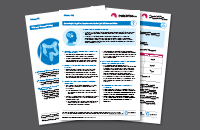 Full Guidelines
Full Guidelines
Click here to view article

 Tools
Tools


 Additional Documents
Additional Documents
Click here to see additional documents

 Endorsements
Endorsements
This Clinical Practice Guideline has been endorsed by the College of Family Physicians of Canada.

 Calculate by QxMD
Calculate by QxMD
This guideline and KT tool(s) are available on QxMD. Click here to download the app.
These recommendations were reaffirmed in 2024.
Summary of recommendations for clinicians and policy-makers
The Canadian Task Force on Preventive Health Care (task force) recommends against instrument-based screening of asymptomatic older adults (≥ 65 years) for cognitive impairment. (Strong recommendation; low certainty evidence)
This recommendation is about screening and does not apply to symptomatic individuals such as those who are concerned about their own cognitive performance (i.e., the patient has raised complaints about cognitive changes with their clinician or others) or who are suspected of having mild cognitive impairment or dementia by clinicians or non-clinicians (caregivers, family, or friends) and/or have signs or symptoms suggestive of mild cognitive impairment or dementia (such as loss of memory, language, attention, visuospatial, or executive functioning, or behavioural or psychological symptoms that may either mildly or significantly impact a patient’s day-to-day life or usual activities).
The rationale for reaffirming the strong recommendation against screening is based on new evidence which is consistent with the 2016 guideline. One new randomized controlled trial showed no difference in health-related quality of life, incidence of mild cognitive impairment, Alzheimer’s disease or other dementia, health care utilization, advanced care planning and prescriptions for acetylcholinesterase inhibitors or memantine among patients screened for dementia. Additionally, the task force considered the opportunity cost of screening all asymptomatic older adults to be important.
Additional Documents
- Clinician Summary
- Screening Protocol (pdf)
- Treatment Protocol (pdf)
- Treatment for MCI Systematic Review and Meta-Analysis (pdf)
- Published Systematic Review (pdf)
- Treatment for MCI Excluded Studies (pdf)
- Screening for CI-ERSC Deliverable (pdf)
- CMAJ Author Podcast
- Guideline Presentation
- Reaffirmation manuscript (pdf)
- Reaffirmation appendices (pdf)
- Screening for Cognitive Impairment: A CADTH rapid response search update to inform the Canadian Task Force on Preventive Health Care reaffirmation (2020) (pdf)
- Screening for Cognitive Impairment: A CADTH rapid response search update to inform the Canadian Task Force on Preventive Health Care reaffirmation (2022) (pdf)
ECRI Evaluation Scores
ECRI Guidelines Trust scores guidelines based on their adherence to the National Academy of Medicine Standards for Trustworthy Guidelines. Find the ECRI evaluation scores for this guideline here. Note, the scores apply to the original 2016 guideline.




